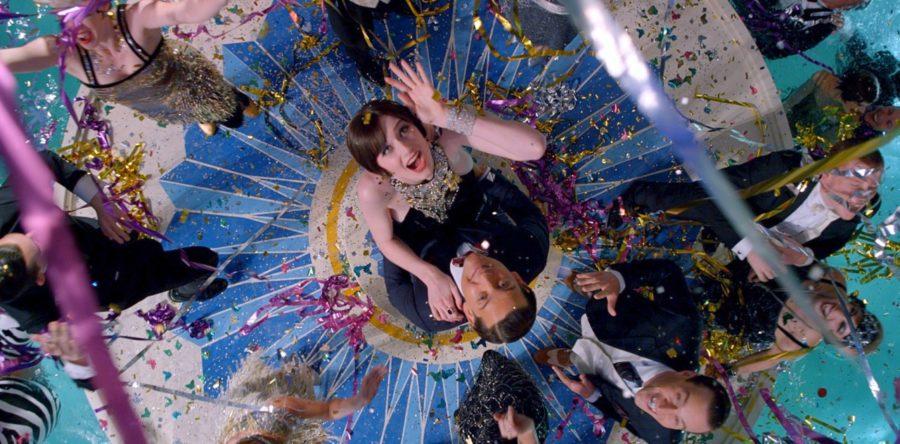Combine a Las Vegas carnival of flashy flamingo feathers, an eclectic music festival mashing together hip-hop and jazz trumpets, and Disneyland’s fireworks, and what do you get? Baz Luhrmann’s adaptation of The Great Gatsby, F. Scott Fitzgerald’s iconic American novel. The new film doesn’t skimp on a single sumptuous detail in building up Gatsby’s flashy, dangerous world, but all the vivid special effects can’t make up for the messiness and lack of believability of this adaptation. The movie is, disappointingly, an extravaganza that submerges and dilutes a narrative that would have been beautiful had it been left to speak for itself.
The plot is familiar to most people who took an English class in high school: Nick Carraway meets Jay Gatsby, an enigmatic millionaire in love with a married woman, Daisy Buchanan. Here, Nick’s instability, which is hinted at in the novel, is extrapolated to the point where Nick is an alcoholic recovering in a sanatorium—that is, Luhrmann interprets Nick’s creation of the novel in a way unseen in the actual literature. The retrospective narrative of Nick is analogous to Lurhmann’s Moulin Rouge! (2001), in which the protagonist tells the film’s story as he’s writing it on his typewriter. Luhrmann seems to have a penchant for this narrative technique, but the retrospection was an unnecessarily dominant and distracting part of the film. There were simply too many scenes of Nick out of the central plotline.
Tobey Maguire does not present himself well as Nick. He is bland, naïve, and wide-eyed, and every word he speaks is too nice for him to fit in with the rest of the catty Long Island crew. His demeanor and voice do not fit with Nick’s cynical tone in the novel—the entire thing is made even worse because so much of the movie is voiced over with narration from the novel, which is a pretty big cop out. Lurhmann seems to have made an effort to use exact quotes from the book, which, when adapted to crunch a dense plot into a two-hour movie, make for a storyline that skips rapidly and incoherently forward. Furthermore, Elizabeth Debicki (Jordan Baker) and Maguire have nonexistent chemistry on screen—Jordan functions as a somewhat useless plot device, and her relationship with Nick is entirely nonexistent.
What’s worse, Gatsby isn’t convincing, either; Leonardo DiCaprio pulls off a good performance as the intense and passionate lover, and his scenes with Daisy have the ring of sincerity—but otherwise, he lacks the charisma that Gatsby is supposed to have. DiCaprio’s “old sport” rings hollow; his speech sounds stilted. The time for DiCaprio’s Gatsby to charm the audience never comes. Nor does he seem to charm Nick. This guts the core of the plot.
On the other hand, Joel Edgerton is completely convincing as Tom Buchanan, the narrow-minded, hypocritical, stuffy, and rather amoral snob. The poor Wilsons, played by Isla Fisher and Jason Clarke, also make their characters seem genuine with their respective shrill showy melodrama and bleary-eyed desperation. And lastly, Carey Mulligan does a fantastic job acting as Daisy. She is every inch the old-money “nice girl” heiress; it’s easy to see how she captured Gatsby’s heart, as well as almost everyone else’s. Her performance is absolutely stunning to see.
It is laudable that the auteur maintains his distinctly stylish and flamboyant cinematography. But this time around the flamboyance was cloying; despite the sparkles and colors, there were no “wow moments” that itched my jaw to drop. Rather, the excess of dazzles and effects only made the movie a pretentious, amateur work.
Editing further exaggerates the flamboyant colors of the movie. Pacing is too quick in the first half—the movie becomes disconcerting and difficult to follow. One terse shot after another simply throws pieces of the story at the audience, instead of presenting a smooth, flowing tale. The highly anticipated soundtrack also subtracts from the film. It becomes a source of distraction; amazing off-screen, on-screen it’s pure noise, and calls the audience away from essential dialogue and narrative.
The Great Gatsby captures much of what was important to the book, but ultimately, the film is overstated and disorganized mush gathered from A-list actors, musicians, and costume designers. The musicians created exciting and catchy tracks specifically for the movie; the costumes represented a fun, vivid, rebellious ’20s vibe. Yet the combined product of this and the hit-or-miss acting was nothing but a large-scale mess. In the end, Luhrmann’s Gatsby, though not unwatchable, is not as great as Fitzgerald’s.









